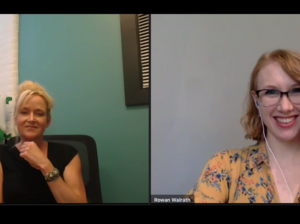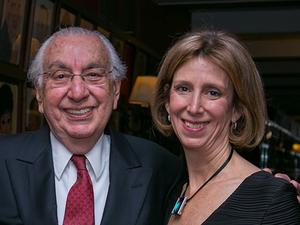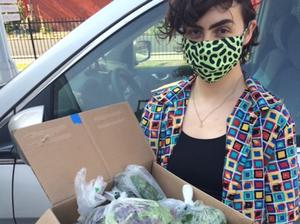At the beginning of the year, few among us would have thought that we would be where we are now. We are living through a once-in-a-generation pandemic, with a disease that has upended every aspect of modern life, highlighted social and economic inequities past the point of ignoring them and put national and local government responses in a harsh new light.
And yet, innovators continue to innovate. At Rhode Island Inno, we've documented how local entrepreneurs have stepped up in the face of a truly unprecedented crisis, finding new ways to give back to this community and advancing the whole ecosystem while they're at it. As it turns out, helping your community pull through a global pandemic requires an entrepreneurial mindset.
Now, we've selected a handful of organizations that are fighting to mitigate the spinout effects of the coronavirus pandemic, from offering tech support to distinct populations to getting food and personal protective equipment (PPE) to Rhode Islanders in need. In some cases, they're even fighting the coronavirus itself.
These are our Crisis Innovators.
Ocean State Shields
About one month after many states began to shelter in place, Ocean State Shields emerged with a line of protective equipment and antimicrobial, nontoxic disinfectant spray that can ward off viruses for up to 90 days. The equipment and spray are intended to help schools and businesses operate safely once the coronavirus slowed and they could open. The product line includes PPE, such as bus and van driver shields.
Ocean State Shields founder and CEO Allyson Cote said the company has come a long way since launch, gaining more than 15 clients including Roger Williams University, Children's Friend and Services of Rhode Island, SVM Public Relations and Communications, and Sprout CoWorking. Cote also said her team has grown from three to nine since April. The startup is now expanding into other states like Florida, Utah and Nevada, with plans to go international as well.
"What we're finding is our clients are choosing us because of the comprehensive nature of our solutions," said Cote. "We can do it all, including custom pre-treated barriers, PPE, HVAC and air filtration, LED germ-inhibiting lighting and our consumer kits for maintenance and additional protection."
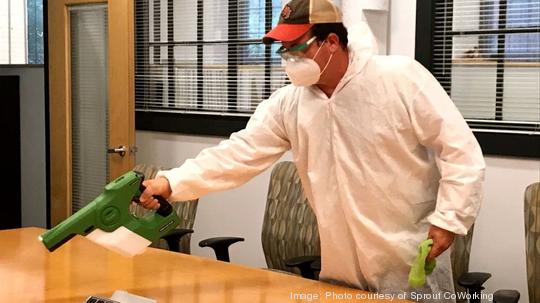
Candoo Tech
Candoo Tech, a remote and in-person tech support service for seniors, launched just last year. But the brand-new startup quickly became a lifeline for isolated senior citizens. The pandemic has taken a particular toll on nursing homes, which are largely still barring visits from any outsiders.
Founder and CEO Liz Hamburg told Rhode Island Inno on our annual Startups to Watch panel that the pandemic catapulted Candoo Tech to squeeze its five-year plan into three months. Candoo is now operating nationally in 12 states, has grown its team to keep up with the new demand and has launched a new remote-only membership. Through Candoo, elderly people have learned to use Zoom to communicate with family members order groceries online and navigate through doctor portals.
"This has really come to the forefront now as people are literally isolated," Hamburg said in May. "They are living alone. They are afraid. They are bored. They can’t be in touch with their family. Realizing that technology can really open up the world to them has been incredible.”
The startup has also partnered with a Russian-speaking social servicing agency that will assist native Russian speakers in New York. Additionally, the company is working with senior living facilities, including Brookdale, which operates more than 800 senior living communities and retirement communities in the U.S.
Intern From Home
After the coronavirus pandemic sent most college students home early, many wondered what they would do with the free time they would have while cooped up at home. Meanwhile, even if the coronavirus shut down the economy, the grind didn't stop for startups. Chuck Isgar, a junior at Brown University and co-president of the school's entrepreneurship program, suddenly saw a match made in heaven. Along with Megan Kasselberg and David Lu, Isgar launched Intern From Home, a job board for startups to post remote internship opportunities for students. The job posts are distributed through a newsletter every two to three days.
The newsletter quickly gained a base of 1,000 subscribers. Isgar said Intern From Home now has student subscribers from more than 300 different college campuses. Intern From Home is planning to continue the newsletter and job board through the fall.
"In fact, we are seeing significant growth of the platform now that many schools have gone to a virtual education model for the fall and students are actively looking for virtual internships," he said.
Isgar added that the job board continues to add new job opportunities for startups and nonprofits in new industries. For instance, the organizations recently partnered with SuitUp, a nonprofit organization, to help them find interns and moderators for their virtual business competitions, which increase college and career awareness for students in underserved communities.
Venture Café and District Hall Providence
For the sister organizations, which both exist under the umbrella of Venture Café New England and operate out of the Point 225 building in Providence, the goal has always been to connect entrepreneurs and catalyze innovation. In March, Venture Café took its staple Thursday Gatherings online and launched the "Virtual Venture Café," which continues to take place weekly over Zoom. It also partnered with Social Enterprise Greenhouse (SEG) to produce “Innovation as an Antidote: RI’s Impact Entrepreneurs Respond to Covid-19,” a virtual weekly series that runs every Wednesday.
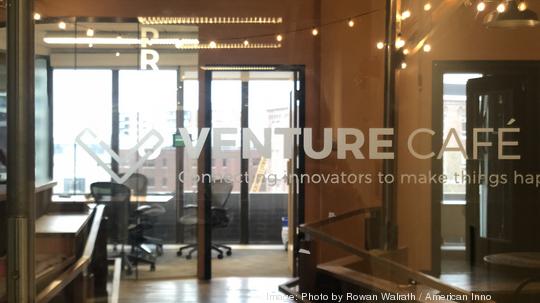
But for Venture Café and District Hall Providence executive director Tuni Schartner, the greatest accomplishment of the year so far has been the Rhode Island Small Business Tech Support program, which her team put together in partnership with SEG, Tech Collective and Rhode Island Commerce. Four days a week—Tuesday through Friday from 1 to 4 p.m.—volunteers make themselves available over Zoom to help small businesses with their digital transformation. That includes setting up search engine optimization, Google My Business accounts, social media and email marketing and more.
"We really meet them where they're at—identify where they're at, what their needs are, where their opportunities leave them," Schartner said. "We're empowering them. It's been really exciting to work on this program."
Schartner estimates that 50 volunteers have led more than 500 tech support sessions with small and medium-sized businesses since the program began in March. Her team is now seeking additional funding to not only continue running the tech support program but make it more robust.
CartwheelRI
In March, Evan McManamy and his roommates in the West End neighborhood of Providence needed to answer a simple question: With the Ocean State under a stay-at-home order and plenty of people in quarantine, how would they and their neighbors get fresh produce?
Necessity is the mother of invention. McManamy and his crew decided to solve the problem themselves. They quickly launched CartwheelRI, a grocery delivery nonprofit that delivers fresh fruits and vegetables, as well as wholesale goods such as dried beans, rice, coconut milk and more, to anyone in Providence.
People in Providence can go to the CartwheelRI site and make their orders through a Google form. They pay for the cost of the goods, which are not marked up, and then CartwheelRI recommends a contribution based on the order. Once the orders are ready, a small fleet of CartwheelRI drivers makes the deliveries. People who work with the organization are paid $15 per hour and also get reimbursed for gas mileage.
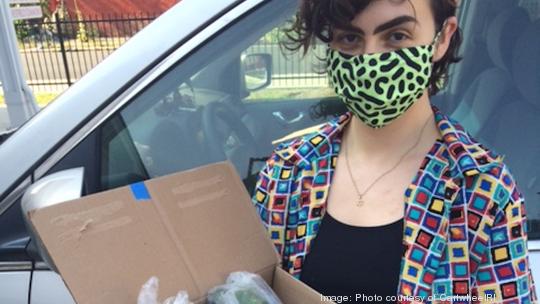
The business, which recently became certified as a 501(c)3 nonprofit, currently operates on a direct-donation model. CartwheelRI makes deliveries to 25 to 30 houses during some of its biggest weeks, McManamy told Rhode Island Inno last month.
“A lot of people are unemployed right now, so many people in our extended communities have free time,” he said. “For all of the folks working with Cartwheel, it’s not a full-time job, but we are trying to find ways during this time when unemployment is so high to find important work for people in the community.”
Rapid Responders
This spring, things were dire for health care workers in need of PPE. The U.S. Food and Drug Administration, which is responsible for approving such equipment for clinical use, was advising hospitals to use expired gowns and surgical masks. Masks, surgical gowns and eye gear required to protect health care workers from the coronavirus were all in short supply.
Kunal Mankodiya, an associate professor of electrical, computer and biomedical engineering at the University of Rhode Island (URI) College of Engineering, stepped up to the plate. He and other faculty members at URI and Brown University started a coalition of researchers and makers called the "Rapid Responders." Within 48 hours, the group grew to 15; by early April, the group had ballooned to more than 75.
Volunteers with FabNewport, the Rhode Island School of Design, Rhode Island Hospital and Rhode Island Commerce all stepped up to produce parts for face shields and masks, as well as the ventilators needed for patients with severe Covid-19 cases. They activated 3D printing farms, sewing machines and more to churn out equipment pieces and get them into the community.
"In the beginning, we were short on PPE not just for hospitals, but for all essential workers—for example, nurses going to nursing homes and assisted living facilities, even firefighters," Mankodiya said. "We actually worked with them, and we came to know about the demand for the PPE, particularly face shields."
Mankodiya said that about 7,000 face shields were ultimately created for local health care workers. The Rapid Responders wound down their operations about a month ago as the demand for emergency PPE waned, but Mankodiya said conversations are ongoing with FabNewport to figure out how the initiative could morph into "a different kind of enterprise in the future."
Rowan Walrath is an associate editor at American Inno, reporting on local innovation in Boston and Rhode Island.
Bram Berkowitz is a contributing writer at Rhode Island Inno.
